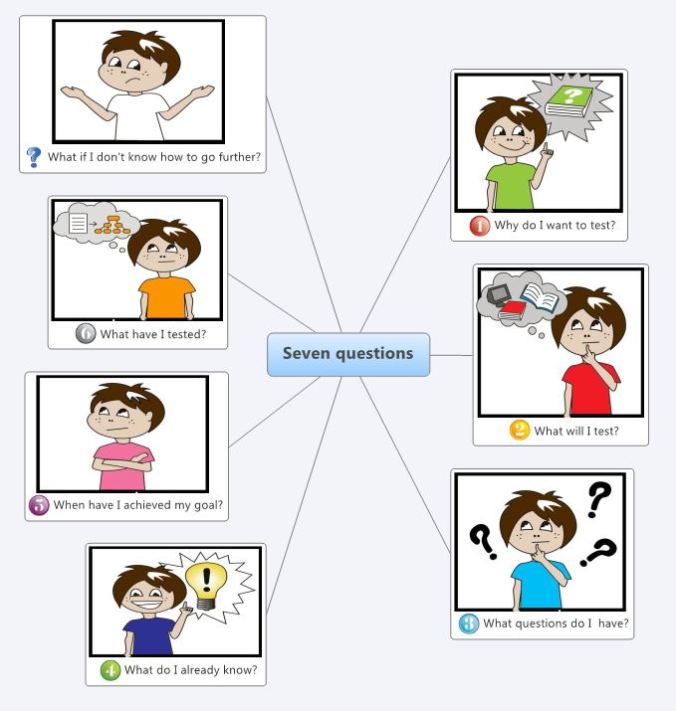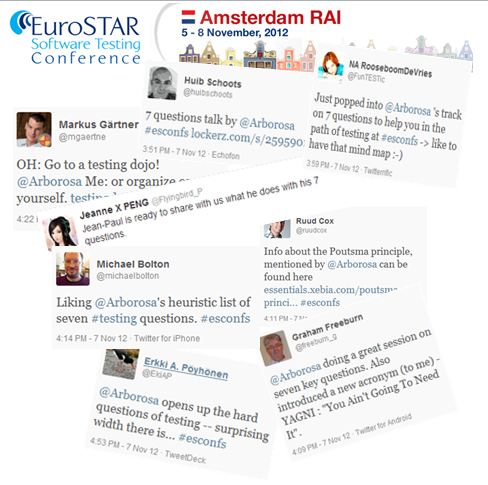This is the opening blog of a small series of posts in which I elaborate on a test approach heuristic using 7 questions that I have developed over the years.
Thinking about testing
As a tester I have seen many approaches to software testing pass me by. A few of them, like TMap (Next) and ISTQB were picked up by the Rabobank and I have had the mixed pleasure of working with them. But regardless of how different the approaches voice out to be from each other they all seem to have a number of things in common:
- They are mostly oriented on management (of testing)
- They focus on processes and deliverables
- They do not teach you how to actually test something in practice
- They hardly make any connection to software development in general
- They are supposedly mastered after certification
I admit that both TMap and ISTQB (initially) helped to give testing a positive foothold in many organisations and have underlined that testing should get its place in software development. Even so the five elements I have described above should also show that there are fundamental flaws in how these approaches apply testing. Following them does not guarantee you to get fully involved into software development nor does it teach you how to test in practice. Usually as a compensation for these flaws testers go to boot camp like courses to teach them more practical testing skills, like determining test coverage and applying test design techniques. Even so for many testers the start-up of their professional life is focused on getting the certification and maybe some introduction to actual testing. And then….well…..for of them most it ends here and they go out to work and follow the processes and deliver a bunch of documents. If your new to software testing this will probably keep you busy for a while, but eventually you (should) start to ask yourself questions like: Is there no better way to test this? Do I really have to write these elaborate test plans / test scripts / test cases that nobody seems to really care about? Why don’t the developers agree with me on my defects? Why is my work not valued?
I have asked myself these and similar questions and over the years I have come up with a set of alternative questions whose answers guide me through a development / test cycle. These questions demand creativity, knowledge and skilled experience to answer them. And any answer you can come up with this time will differ the next time you ask yourself that same question again.
The seven questions I use are:
I have done a talk on these seven questions at EuroSTAR 2012 and will do the at Belgium Testing Days 2013. Contact me there if you want to meet and talk, or sent me a tweet @arborosa .
Here are some twitter reactions that I got from talking at EuroSTAR 2012


Bummed I missed your talk at EuroSTAR, but now I really look forward to the next parts in this series 😀
LikeLike
Thanks for ur post.
I liked this post and before any one starting their professional career/ preparing for certifications – testers should answers these 7 questions.
LikeLike
Hey, I think your site might be having browser compatibility issues.
When I look at your website in Safari, it looks fine
but when opening in Internet Explorer, it has some
overlapping. I just wanted to give you a quick heads up!
Other then that, very good blog!
LikeLike
Thanks for the compliment and heads up.
I must admit I usually only check desktop versions of Chrome, IE, Firefox and mobile versions of Safari, Chrome, and IE.
But I haven’t done that for a few weeks. Could you sent me some pics of what you are seeing. Will try to amend.
LikeLike